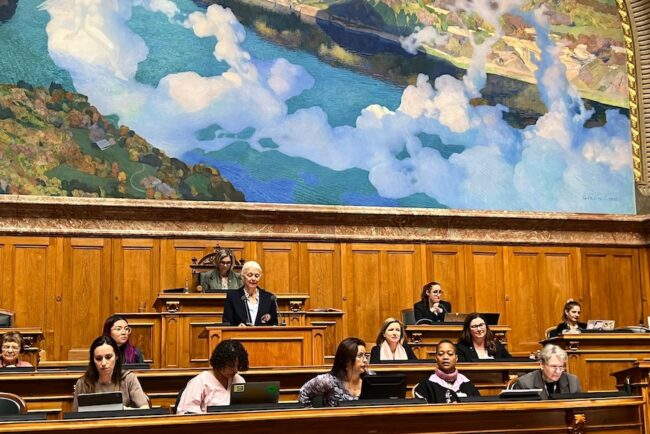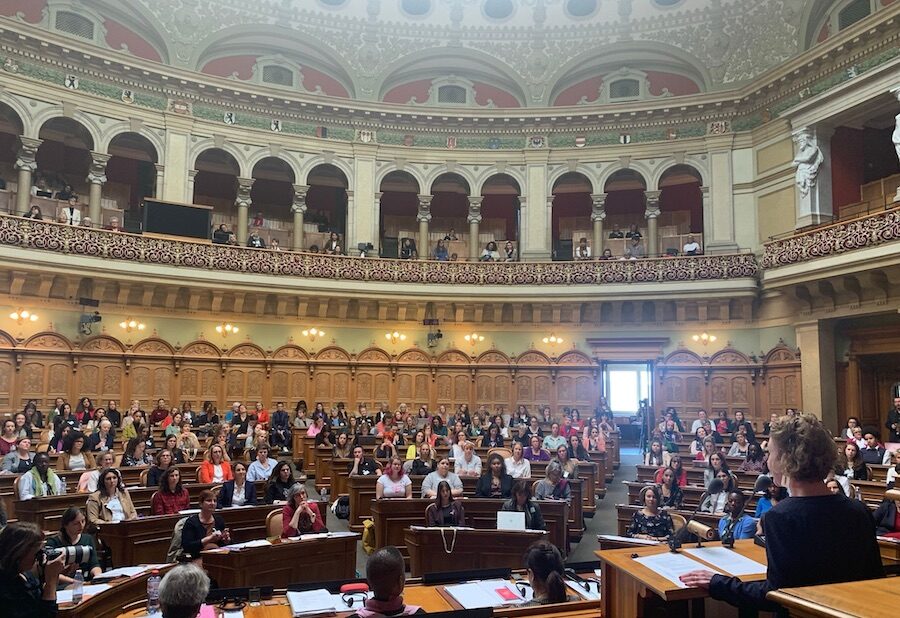Swiss women push for a wellbeing economy amongst other tangible policies on gender equality
28.11.21
Switzerland – For two extraordinary days, women took over the Parliament in Bern where they debated various women’s rights issues at a 'women's session', adopting motions to progress gender equality in Switzerland. MMM was there and actively participated in discussions on unpaid family care work.

It is fifty years since women in Switzerland finally gained, in 1971, the right to vote and stand for election, one of the last countries in Europe to offer women equal political rights. Since then, progress on women’s rights has been slow – for example, paid maternity leave was only granted in 2005, and paid paternity leave was finally voted in 2020. Women are still in the minority in almost all decision-making bodies, and Switzerland continues its struggle to achieve true equality in politics, the economy and society.
 Enter Alliance F, an umbrella organisation made up of Swiss women’s organisations, who together with other partners, initiated a Women’s Session on 29 and 30 October 2021 – the second of its kind: the first Women’s Session took place 30 years ago.
Enter Alliance F, an umbrella organisation made up of Swiss women’s organisations, who together with other partners, initiated a Women’s Session on 29 and 30 October 2021 – the second of its kind: the first Women’s Session took place 30 years ago.
 246 elected women from all regions of Switzerland, all ages and all ethno-religious and socio-economic backgrounds, sat in the National Council (the lower house of the Swiss Parliament) for 2 days. Working as a real parliamentary session, they debated and voted on concrete demands prepared by 8 Commissions set up for the event. Issues discussed included equality at work, women’s pensions, unpaid care work, rural women, women and ICTs, sexual health, women in Science and violence against women.
246 elected women from all regions of Switzerland, all ages and all ethno-religious and socio-economic backgrounds, sat in the National Council (the lower house of the Swiss Parliament) for 2 days. Working as a real parliamentary session, they debated and voted on concrete demands prepared by 8 Commissions set up for the event. Issues discussed included equality at work, women’s pensions, unpaid care work, rural women, women and ICTs, sexual health, women in Science and violence against women.

At the end of the Session, 23 motions were adopted and presented to representatives of the Parliament and the Federal Council.
Thanks to her affiliation to MMM, Geneva-based Valerie Bichelmeier, head of our UN delegation, was among the women elected for this historic Women’s Session. She actively participated in the work of the Commission on the recognition of unpaid care work, one of MMM’s key focus topics, and co-presented one of its 3 motions.
This motion, which was adopted by the Session, seeks to address the issue of the economic invisibility of unpaid care work through systemic changes to our economic systems. It proposes to steer economic policymaking away from the GDP growth narrative, and calls instead upon the government and all the economic and social actors to engage in an in-depth rethinking of our economy, its purpose and objectives, its value system and its indicators, so that the wellbeing of people and the planet are prioritised. As a concrete step to launch the process of bringing about systemic change, the motion therefore calls the Swiss government to join the Partnership of Governments for a Wellbeing Economy (WEGo),
This is in-line with MMM’s view that in order to effectively recognise unpaid care work and redress the economic injustice resulting from its inequitable distribution – which affects mothers disproportionately – systemic changes are needed to our economic system. This is also the purpose of our membership to the Wellbeing Economy Alliance.
We therefore intend to continue to promote this motion in Switzerland so that at the very least a discussion takes place at the parliament on the need to repurpose our economy to serve the wellbeing of people and the natural environment – not the other way round.
See also
- Our 2020 HLPF side-event on Care and education – cornerstones of just and sustainable economies
- Our 2021 HLPF side-event on Changing narrative on unpaid care work and the economy

Breaking the Cycle: Gender Equality as a Path to Better Mental Health
18.03.25
The Council of the European Union has taken a decisive step in recognising the vital connection between gender equality and mental health.
Europe Must Listen to Mothers: Our landmark report heads to the European Parliament
28.08.25
On 22 September 2025, the voices of mothers will take centre stage in Brussels. For the first time, Make Mothers Matter (MMM) will present its State of Motherhood in Europe
Belgian Mothers Face Alarming Rates of Burnout and Perinatal Depression, New EU Survey Finds
03.07.25
Belgian mothers are facing a mental health crisis. According to the State of Motherhood in Europe 2024 survey by Make Mothers Matter (MMM) and Kantar, Belgium reports the highest rates








